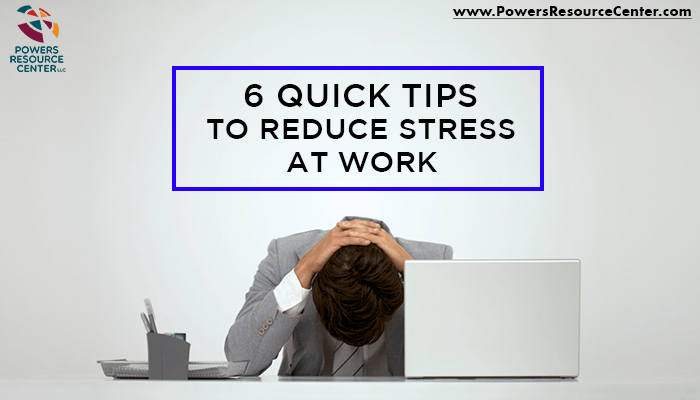Stress is integral to work. It’s the fuel that gets things done. Job stress within your comfort zone helps you stay focused, energetic and able to meet new challenges. Stress is what keeps you on your toes during a presentation or alert to avoid mistakes.
While some job stress is normal, excessive chronic stress can interfere with your productivity and performance—and impact your physical and emotional health. the American Psychological Association reported that more than 40% of adults in the United States say they lie awake at night plagued by the stressful events of the day. This is one of the warning signs that you are over-stressed. You can’t control everything in your work environment, but that doesn’t mean you’re powerless. Whatever your work demands or ambitions, there are steps you can take to reduce work stress and protect your mental health from its damaging effects.
I can’t solve workplace stress in a single blog post, but as we approach budget-planning season – not to mention the election season and the holiday season! – I wanted to pass on a few easy-to-put-into-practice stress management tips to keep stress at bay, achieve better job satisfaction, and keep your well-being a priority.
How to Reduce Workplace Stress
Tip 1: Clear Your Headspace. It is said that more than 60,000 thoughts stream through your mind each day. Don’t let those messages be negative. Instead of being harsh and critical of yourself or cynical about the world around you, try pumping yourself up and looking for the good. Encouraging thoughts will keep mental health problems at bay, help motivate you to achieve, and ultimately train you to inspire others.
Tip 2: Take a breath. If you’re feeling overwhelmed or you just exited a tense meeting and need to clear your head of work-related stress, a few minutes of deep breathing will restore balance and aid in stress management, as well as reduce the stress hormone cortisol. Use mindfulness techniques to remain present and aware of your thoughts, feelings and environment without judgement.
Tip 3: Take Control of Your Day. Over-scheduling and constant interruptions are productivity killers and stress builders. Re-prioritize your to-do list every day with what you can realistically get done in your work scheduling. Schedule time blocks to read and respond to email, and separate time blocks for focused activities. Give yourself breaks throughout the day to walk, stretch or do breathing exercises, and take a break from workplace stressors. You can’t stop interruptions from co workers, but you can control your response to them – accept them as a priority or schedule them for a later time. This will help your work performance.
Tip 4: Eat Right. Your food choices can have a huge impact on how you feel during the work day. Eating small, frequent and healthy meals, for example, can help your body maintain an even level of blood sugar, keeping your energy and focus up, and avoiding mood swings that can lead to more work stress. Balanced blood sugar is good for the immune system.
Tip 5: Get a Great 8: An estimated 60 mi犀利士
llion Americans do not get sufficient sleep, which is a critical recovery period for the body. Not only can stress and worry can cause insomnia, but a lack of sleep can leave you vulnerable to even more work stress. When you’re well-rested, it’s much easier to keep your emotional balance, a key factor in coping with job and workplace stress. Try keeping a regular sleep schedule and aiming for 8 hours a night. This will help you avoid stress-related health problems.
Tip 6: Get moving. When workplace stress is mounting and the work demands feel overwhelming, take a quick break and move away from the stressful situation. Take a stroll outside the workplace if possible. Physical movement can help you regain your balance, ease muscle tension, reduce high blood pressure and stress levels. Outside of work try to get 3-4 days of aerobic exercise—activity that raises your heart rate and makes you sweat—to lift your mood, increase your energy and sharpen your focus.
If work stress has become rampant in your organization and you need some outside help to get it into check, contact Powers Resource Center at https://www.powersresourcecenter.com/contact/ for a stress-free evaluation.
Related Posts
-
Employee Engagement Questionnaire: Are You Engaged or Disengaged At Work?
The problem is that disengagement is like a virus that spreads quickly. It has immediate negative repercussions on productivity, communication, collaboration, innovation, morale, customer service, you name it! Not surprising, it's also costing your company BIG TIME.
-
Employee Engagement Questionnaire: Are You Engaged or Disengaged At Work?
The problem is that disengagement is like a virus that spreads quickly. It has immediate negative repercussions on productivity, communication, collaboration, innovation, morale, customer service, you name it! Not surprising, it's also costing your company BIG TIME.
-
Employee Engagement Questionnaire: Are You Engaged or Disengaged At Work?
The problem is that disengagement is like a virus that spreads quickly. It has immediate negative repercussions on productivity, communication, collaboration, innovation, morale, customer service, you name it! Not surprising, it's also costing your company BIG TIME.





